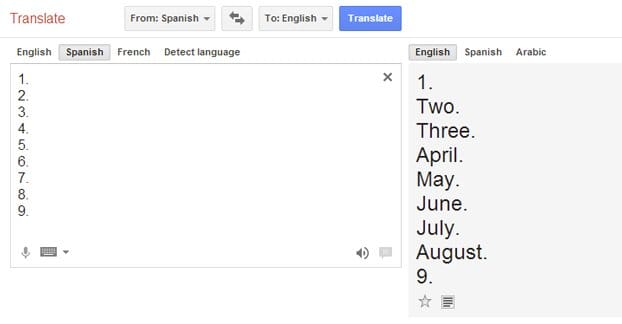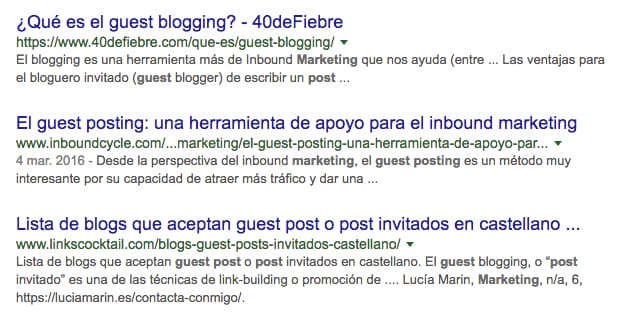Sometimes a lot of us tend to forget that there’s a lot of internet out there that isn’t in English. English has become a sort of de facto language for a lot of global commerce and information exchange, but it is by no means 100% dominant, nor is it exclusive. There are great communities, excellent sites, resources, and blogs all in non-English languages. Heck, the BBC has shifted the paradigm themselves by creating a Pidgin version of their site.
If you cater to a multilingual audience, if your content is aimed at other countries, or even just if you want to see if you can get content published in another language, it’s entirely possible. Guest posting on foreign language sites can be useful, though you do have to remember that there is a pretty steep divide in value between them.
What I mean is that a guest post on a Spanish site, you can gain a Spanish audience and relevance in Google.es searches, but it won’t help you much when it comes to English search results. It’s generally only worth doing if you have an audience you need to serve in that language, and only if you can pull it off.
The general process for guest posting is basically the same as what I have written over here and in other blog posts on this site. You need to identify sites in your language you might be able to guest post on, you need to pitch a post, you need to create that post and you need to promote it once it’s published.
The Ideal Method
Now, the ideal way to do all of this for a site that is primarily or totally in a foreign language is to be fluent in that other language. French Canadians can use French to create content for French-aiming websites. On the other side of the country, people fluent in both English and Spanish will have an easier time writing for Mexican sites and sites in other areas of south America.
If you don’t know the language, be very careful about trying to communicate with them. It can be tempting to rely on Google Translate or whatever translation service you prefer, but they’re all pretty poor quality. They can get you the general idea of a sentence, but there are a lot of nuances to various languages that even a minor typo can completely change.
The ideal solution, if you don’t know a second language but absolutely want to post content in that second language, is to hire someone who is fluent in both your language and that second language. You can pick up a professional translator, or you can hire a freelancer who happens to have that kind of language fluency and is willing to use it. Of course, translation can be expensive. Even just outsourcing translation can run you 10-30 cents per word, and when you’re factoring in a couple thousand words of blog posts and another thousand or two worth of emails back and forth, you can rack up costs pretty quickly.
Alternatively, you can look for someone on a site like Freelancer.com or Upwork who is a resident of the country you’re trying to reach and speaks the language. You could hire them to create content and even do the pitching for you, outsourcing the entire process. You can also find blogging agencies that can do this for you, with less oversight and more expense.
The problem with both of these methods is that you still need to be able to check your content for value and plagiarism, if you purchased the content. You need to somehow verify that the content is legitimate and that the translation is accurate. It’s just difficult to work in a language you don’t understand.
Finding Sites for Guest Posting
When it comes time to find sites you might be able to guest post on, it’s going to be a little tricky. See, as I mentioned, Google is heavily weighted towards English. Here’s an example.
Go to Google and put in “marketing “guest post” inurl:.es” as your query. Marketing is the keyword, guest post is in quotes to find sites that talk about guest posts, and the URL parameter looks for pages that have the .es domain, which is for Spanish sites.
My results are interesting. I have oinkmygod.com as a Spanish site, godigital.es as a Spanish site, and then Kissmetrics, which is very much not Spanish. My results are about 50/50 English and Spanish, despite the URL restriction. I’m not going to find many good hits this way.
Now take it one step further: go to www.google.es and run the same query. This time, I get godigital.es, giraldodetodounpoco.wordpress.com, oinkmygod.com, quondos.com, and others. What I don’t get is any English sites, because it’s Spanish Google. However, the search terms are still in English, so I have no way of knowing how accurate or how valuable those sites are.
As an experiment, I ran both “marketing” and “guest post” through Google Translate to get the Spanish versions, which are “marketing” and “puesto de invitado” respectively. That search, on Spanish Google, comes up with a lot of Pinterest results.
Now, this is all an experiment. I’m not fluent in Spanish, and have no way to verify the quality of the content on these sites I’m finding. All I can say is that the Spanish search index is much smaller and that there aren’t many sites focused on marketing.
You can, of course, vet the sites you find the same way you vet sites in English. Run them through site checking tools like Moz’s Open Site Explorer or Majestic and look at the metrics. It’s not like the value of a link is different in another language.
Once you have sites in mind that you’re pretty sure are reasonably high quality and in your niche, you need to figure out how to communicate with them. Generally, this means writing up your guest post pitch and then paying someone to translate it for you. Google Translate alone isn’t going to suffice; it can get you the general gist of a response email, a “yes” or “no” response is pretty clear, but for the actual pitch and post, you want someone fluent in the language to translate or create it for you.
So do you opt for translation or creation? Personally, I would go with creation. Translation can always be a rocky proposition. You might end up writing about a topic that’s not actually available in that language or location, or you give steps that get muddied or lost along the way. Instead, you want to have guidance for your post and give that guidance to a freelancer who is capable of writing in that language. You can use Google Translate to verify that the information is good enough, but you still have to trust the freelancer not to be spinning content and to be creating good content.
Thinking About Value
I know some of you out there are thinking that foreign markets are untapped lands, with less competition and more interest available for you to capitalize. That’s what businesses have been thinking for as long as there have been businesses and more than one place to sell. Expanding into foreign markets has been a great choice for a lot of different businesses throughout history.
The problem is, from an SEO perspective, it’s absolutely not worthwhile at all.
So here’s the thing. When you get a guest post pitch from someone who clearly has a tenuous grasp of English, what do you do with it? I know in my case it pretty much just goes into the trash. Anyone who can’t master enough English to write a pitch isn’t going to master enough to write a good blog post. I don’t want a blog post in poor ESL on my site. It doesn’t look good to Google, and it isn’t going to look good to my readers.
Now flip it around. You might know perfectly fluent English but very little Spanish, or French, or Tamil, or whatever other language you were looking at targeting. You submit a pitch, and now you’re the person sending a poorly worded pitch to someone else. Do you think they’re going to want to publish your content? It’s not like Google is more forgiving of language disparity just because it’s in the other direction.
Even disregarding that, what is the value you want to get out of a guest post? Guest posts bring you two things: traffic and a link. If you get traffic from a Spanish site to your English site, how many people are going to stick around to read? How many of those people know enough English to get value out of your site anyways?
Then you have the link side of things. If you do a backlink audit on your blog, I bet you’ll find you have a bunch of links from foreign language sites already. I also bet that a lot of them are basically spam. Some might be legitimate, but a lot of them won’t have value at all.
If you want to rank for a foreign version of Google, you need actual foreign content on your site, not just links from a foreign language. You need a crawlable site structure and enough content to make your site worth ranking compared to your competition in that language. It’s a lot of work to set up a bilingual or multilingual site in the first place. Frankly, a lot of the value from foreign links is wasted on an English-only site.
That’s not to say every link is bad. If you’re fortunate enough to have a link from, say, the Google China blog, yeah, you’ll get a lot of value from it. And yes, you’ll get some traffic from links originating on good sites; more people learn English as a second language than English-speakers choose to learn a second of their own.
However, this all means you need to actually be able to provide value to people speaking that second language, and you need to get links from good, high profile sites focused on that language.
True Necessities
Honestly, if I were going to try to get guest posts on non-English sites, my first order of business would be to hire a writer who is fluent in both languages. I want someone who meets all of the important criteria:
- Able to communicate with me fluently.
- Able to write a good blog post in the second language of choice based on my instructions.
- A broad enough knowledge to help recommend or suggest bilingual or monolingual sites in the foreign language of choice.
This isn’t really a freelancer; this person becomes a key component of my marketing. Under my guidance, they create the copy for pitching a guest post, they write and submit the guest post, and they relay to me information from the user. If I need something translated, they’re who I go to. They end up with a lot of trust from me, so they need to be carefully vetted.
You can consider a guest posting agency that operates in a foreign language, but you have to be careful. There are a lot of agencies out there who are basically operating PBN scams and who won’t get you much value at all. You’ll get what they tell you are guest posts in that language but you have even less way to verify than you do in English transactions. It’s a dangerous world and you can easily have your money wasted.
Just think about what you want to get out of foreign language guest posting, and see if all the additional hassle, risk, and expense is worth the value you expect. Who knows, maybe it is.
 ContentPowered.com
ContentPowered.com







